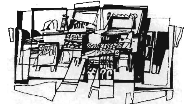Articles/Essays – Volume 02, No. 3
A Normal Childhood
We asked if there were ever any hard feelings or jealousy between the wives or families. He said that, to the best of his knowledge, there were never any serious problems of this sort. One of his brothers asked several of the wives this question and they replied that they felt about each other the way that they would feel about a sister. One time in which there may possibly have been some bad feeling was when President Cannon served in Congress and was only able to take one wife back with him. The other wives and their children stayed in Salt Lake.
We asked where and under what conditions they lived. He said that his life was spent on what was called The Farm, which was located in the area of 13th South and 8th West. Each of the wives had a separate house and the five houses were lined up in a row and stood relatively close together. Hence, the children of all of the wives played together and became as close as any “whole” brothers and sisters would be. (He said that among the five surviving children now there is a feeling of closeness that he has never seen surpassed—even though they have come from three different mothers.) On The Farm each child had his or her own job to take care of. For instance, Espey was responsible for milking several cows each day.
Apart from the five houses stood a building that was used both as a school for the thirty-four children and as a combined family dining hall. Apparently some of the meals were taken in this building and some in the individual homes. Every morning before breakfast President Cannon would read a chapter of scripture to the whole family as they were assembled together. Then, all would kneel and lean on their chairs, which were turned around, and have family prayer, with one of the family chosen to be the “mouth” for the whole group. In the dining hall there were five separate tables, each wife and her children sitting at one. The meals were prepared by two Chinese cooks and served by the five maids who worked in the five houses and usually assisted with the house work.
President Cannon was fairly wealthy, having made a considerable amount of money through various mining stocks, and owned other land besides The Farm. There was a farm (consisting mainly of fruit orchards) out near where a sugar factory is now located in West Jordan, a farm in the valley on the way to Park City (on which hay was grown), and a large ranch which included 50,000 acres in the East Canyon area.
On Tuesday evenings the household of Martha Telle Cannon (Espey’s mother) was in a high state of excitement because that was the regular time for President Cannon’s visits. He would come for dinner, and the best linen, china, etc., were always used. Espey remembers how excited all the children were when their Father would arrive (wearing a stovepipe hat and a Prince Albert coat) and alight from his fancy carriage, which was driven by a chauffeur. After dinner the family would gather together and have a “home night” together. All of the children were expected to contribute to the program by using such talent as they possessed, and President Cannon would always read or teach them from the scriptures.
Espey said that his brother Collins used to enjoy telling a probably exaggerated anecdote about the time when he was walking down the street in Salt Lake City and met his father and said “hello.” President Cannon said “hello” in return and then stopped and asked the little boy what his name was. Collins replied, “I’m your son, Collins.”
Espey said that he considered his childhood a very happy time and one that seemed then and seems to him now not abnormal in any respect.


 Back to full Issue
Back to full Issue

